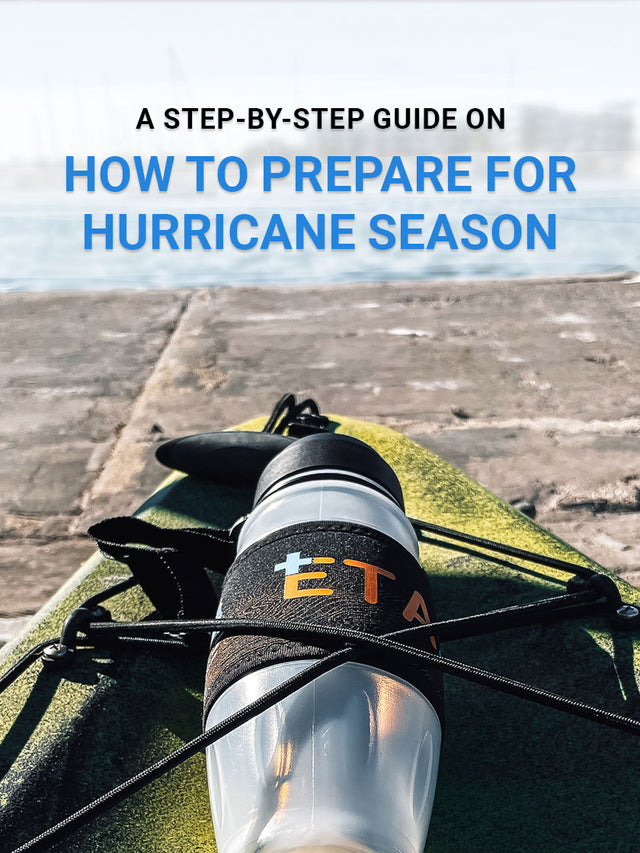
A Step-by-Step Guide on How to Prepare for Hurricane Season
Hurricanes are gigantic, turbulent, and dangerous storms. They generate winds that are at least 74 mph (119 km/h) of speed which is even quicker than a cheetah, the fastest animal known. Trees, water bodies, vehicles and buildings can be harmed by the strong hurricane winds causing not just material damage but also destroying life. You, your family and your loved ones can lessen the effects of the storm by being prepared and educating yourself with the best measures to undertake for security and protection during the season. Before the threat becomes imminent is the ideal moment to begin. Let’s dive deeper and understand the steps on how to prepare for hurricane season.

Pre-planning for the hurricane season
It can be too late to prepare or take some measures if you wait until a storm watch or warning is issued. By taking action before the start of the hurricane season, you may reduce property damage and handle any storm situation with less stress while keeping your family safe. Your pre-planning stages can include the following steps:
- Make arrangements to protect your property. The most effective window protection comes from permanent storm shutters. You can apply tape to avoid window damages.
- In order to firmly tie your roof to the frame structure, install straps or additional clips. This will lessen damage to the roof.
- Make sure the trees and bushes surrounding your property are properly pruned.
- Clean out the drains and gutters that are clogged and loose.
- A first aid kit, food and water, emergency supplies with an emergency kit and items for young children, elderly or disabled family members, and pets, should all be gathered as emergency supplies.
- Supplies should be kept in a water-resistant, portable container with handles, like a plastic tub.

Just as preparedness for hurricanes, it is important to pay close attention and act according to the guidelines during a hurricane occurrence. Here are a set of tips on how to prepare for hurricane season and its occurrence:
- For information, turn on the TV or radio. Always get the latest weather news and updates.
- Secure your home, shut the storm shutters, and move any outdoor items inside or secure them.
- Unless specified otherwise, turn off all utilities. Keep the refrigerator doors closed and set the thermostat to the coldest setting to protect the food inside.
- Turn off propane tanks. Refrain from using the phone unless a true emergency arises.
- Make sure there is water available for uses like consumption and cleaning and toilet flushing. Water should be added to the bathtub and other such containers as a backup.
Things to do after a hurricane occurrence
Here are the things to be aware and cautious of after a hurricane:
- Keep an ear out for announcements from your local authorities on weather radio, local radio or TV stations.
- If you are ordered to evacuate, go back home as soon as local authorities decide it safe to do so.
- Check for damage in your house.
- Prevent falling power lines. Never interact with anything that comes into contact with electricity lines, especially any water or water puddles that may be close to downed power lines.
- By boarding up damaged windows, you can help prevent vandalism and extra weather damage to your property. Plan for affordable temporary fixes.
- Be cautious of any gas lines that the storm may have broken or damaged. If a gas leak is suspected, wait until the utility provider deems it safe to enter the property. Always use a flashlight; never use a candle.

Rack up supplies for emergencies: How to prepare for Hurricane Season
You could need goods before, during, and after a hurricane to keep your family secure, protected and healthy. Keep in mind that a hurricane may shut off your water and power. Additionally, if your car has been damaged, you might not be able to drive. Roadways could be blocked or flooded. To be on the safe side, stock up on anything you might need right away and other survival essentials. Make sure to get the following ready:
- A storage of food and water for emergencies.
- An emergency supply of medication.
- Emergency power sources like flashlights (and additional batteries, of course).
- Personal items.
- Important papers such as wills, passports, and personal identification documents.
- Extinguisher for fires. Make certain that your family is aware of where it is and how to use it.
Risk to water supply due to hurricanes
The public water supply may get contaminated by hurricanes, particularly if they are accompanied by flooding or tidal surges. Contaminated water can make you sick. No one should take the hurricane-affected region's water for granted that it's safe to drink. Water treatment facilities might not be operational in the region affected by a hurricane or tropical storm. Storm damage and flooding can contaminate water pipes even if they are not under usual circumstances.
Keep an eye out for any news regarding the security of the public water supply. After the storm has passed and the floodwaters have receded, your well has to be checked and disinfected if it has been flooded. To guarantee that all pathogens are eliminated, it is crucial to disinfect both the drinking water well and pipes with 4-6 percent chlorine, unscented household bleach. Remove all membranes, cartridges, and filters from any water treatment equipment you may have, and then replace them once the chlorination process is finished.
ETA in action

Testing the water is the only way to determine whether it is safe to drink. Despite being efficient against bacteria, chlorine bleach cannot get rid of chemical contaminants that might have seeped into your well.
ETA was created as a breakthrough since there wasn't a water purifier that could be relied upon to produce extreme filtration, especially in a crisis such as hurricanes. The newest IAMF technology is installed in the ETA Alkaline Water Filter Bottle, which has been tested extensively to be useful, handy and beneficial in extreme and dire situations due to natural or manmade disasters. The filtration procedure is activated by a unique and creative sip and squeeze mechanism on any water, from any source available at your disposal. ETA's Extreme Filtration capability allows for the elimination of all four types of water contamination, including chemical, dissolved solids, aesthetic, and radiological contaminants, while simultaneously producing alkaline water with a pH of 9.5 that lasts up to 30 days.
It will be easy to access consumable water, one of the most important items on your checklist for survival, using ETA's specific expertise in extreme filtration. With ETA, you can filter out any polluted water and transform it into pure, safe-to-drink water, staying hydrated during emergencies instead of storing gallons of water. You can trust ETA to keep you safe even if your drinking water system is damaged or contaminated as a result of a hurricane and thereby, become your ultimate must-have during any emergency situation.
